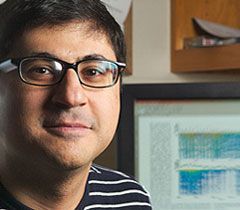This is the course website for the Spring 2017 course Fundamentals of Disease Biology II (ECOL 8520) taught in the Odum School of Ecology at the University of Georgia for the Interdisciplinary Disease Ecology Across Scales PhD program.
Course Description
The fundamentals of infectious disease biology focusing on microparasite infections (e.g., viruses, bacteria). Taught in four-week modules, the course covers essential concepts in ecology, evolution, immunology, biochemistry, cell biology, and metabolism as they relate to specific infectious diseases. Each module is self-contained, and students can register to receive credit for one or more modules. For Spring 2017, these modules are: Morbillivirus (January 9-25), Mycoplasma (January 30 – February 15), Arboviruses (February 20 – March 15), and Influenza (March 20 – April 5).
Instructors
Prof. John Drake
John received his PhD in biology from the University of Notre Dame. His research seeks to understand the dynamics of biological populations and epidemics, focusing on how to bring experimental or observational data together with mathematical theory. Practical applications of this work include drakedecision support for managing invasive species, mapping the spread of infectious diseases, and forecasting disease emergence. Current projects focus on Ebola virus in West Africa, spread of White-nose Syndrome in bats, and the development of a new theory for early warning systems of emerging infectious diseases. Before coming to UGA in 2006, John was a Postdoctoral Fellow at the National Center for Ecological Analysis and Synthesis in Santa Barbara, California from. In 2012, he was Leverhulme Visiting Professor in the Department of Zoology at Oxford University. More about his lab’s work is available here.
 Prof. Pej Rohani
Prof. Pej Rohani
Pej received his PhD in biology from Imperial College London. His areas of expertise are the dynamics and evolution of host-parasite interactions. He is the author of Modeling Infectious Diseases in Animals and Humans, a leading textbook on infectious disease dynamics. Current projects focus on the transmission and evolution of Bordetella, the bacterium that causes whooping cough, and the design of statistical algorithms for detecting disease emergence. Before coming to UGA in 2015, Pej held positions at the University of Michigan, University of Cambridge, and University of Utah. More about his lab’s work is available here.